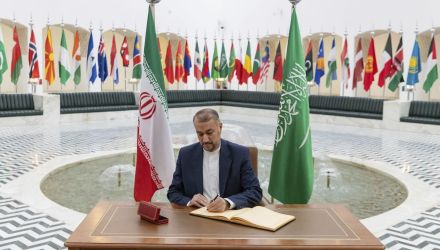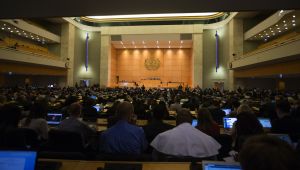If there’s a fog of war, there can also be a fog of peace — in which even the negotiators aren’t sure of the consequences of what they’ve done. Some of that murkiness surrounds thebargaining in Geneva to limit Iran’s nuclear program. There’s sharp disagreement among observers about the potential risks and benefits of this seeming breakthrough between Iran and the West after 34 years of hostility.
A cautionary historical note comes from Sir Mark Sykes, who negotiated with his French counterpart Francois Georges-Picot the famous 1916 agreement that carved up the Middle East with artificial borders that cause trouble to this day. According to David Fromkin’s masterful study “A Peace to End All Peace,” Sykes said of his strategy meetings with Lord Kitchener to plan policy: “I could never make myself understood; I could never understand what he thought, and he could never understand what I thought.”
As the Iran deal has taken shape, a backstage brawl is developing with Israel and Saudi Arabia, two countries crucially affected by the deal. The unrelenting attacks on the agreement by Israeli Prime Minister Benjamin Netanyahu, which are the culmination of four years of mistrust between him and President Obama, are rumbling the bedrock of the U.S.-Israeli relationship — a consequence neither country wants.
But there’s an intriguing upside: The Israeli-Saudi mutual dislike of the Iran nuclear deal, and their de facto alliance against it, may weirdly prove one of the “silver linings” of this negotiation. Indeed, if the Israelis become a protector and defender of the Sunni Muslim countries, that could have lasting security benefits for Israel and might even open the way for progress on the Palestinian issue — without the usual American mediation.
It’s worth remembering, in this regard, that one reason Egypt’s Anwar Sadat and Israel’s Menachem Begin found common ground in 1977 was a mutual fear that the United States might try to impose a comprehensive peace agreement over their heads.
The U.S. opening to Iran will also affect the Sunni-Shiite sectarian schism that is causing so much bloodshed in the Middle East. But it’s hard to predict just how this will play out: Saudi Arabia and other Sunni powers have been waging a proxy war against Iran across the region — in Syria, Iraq, Bahrain and Lebanon. If the United States isn’t careful in how it manages its engagement with Shiite Iran, it could tilt this sectarian conflict even more toward extremist Sunni jihadists and extremist Shiite Hezbollah fighters who increasingly dominate the fight in Syria and elsewhere.
Obama is right to step away from the Sunni-Shiite schism. But an unintended danger would result if the United States were seen to be trading its longtime Sunni allies for new Shiite partners. That would be the equivalent of kicking over the hornet’s nest, making the region even more dangerous.
Another danger looming in the fog of peace is that the agreement being negotiated with Iran is meant to be an interim, first-step pact. Yet diplomatic history is full of interim agreements that never get into second gear. Indeed, they often set the stage for a bloody new round of confrontation as each side jockeys for leverage in the final negotiation. I hope the United States and Iranian negotiators have a clear road map already set for the endgame; otherwise they may quickly lose their way.
A final contrarian point about these negotiations is that even as the United States opens to Iran, it must deepen its commitment to moderate forces in the Arab world. That means working with Egypt (and its backers in Saudi Arabia and the United Arab Emirates) toward economic and political stability and restoration of civilian government. It means a more muscular policy in Syria, hopefully including protected “safe zones” that can diminish the humanitarian disaster there this winter and bolster moderate forces within both the opposition and the Syrian government.
What Gulf Arabs and Israelis fear most is that U.S. engagement with Iran will be accompanied by American disengagement from the region. This is why Obama’s incessant talk about ending wars in the Middle East and his blink on using military power in Syria frightened these countries. They saw it as a prelude to a general U.S. retreat. Obama must signal that an agreement with Iran is instead a bridge to a regional security framework in which U.S. power remains the guarantor.
Don’t get me wrong: An agreement with Iran is potentially Obama’s greatest success. But it’s worth thinking unconventionally about potential risks, even as we savor the prospect of a diplomatic triumph.
Ignatius, David. “Backstage Brawl Over A Deal.” The Washington Post, November 22, 2013




